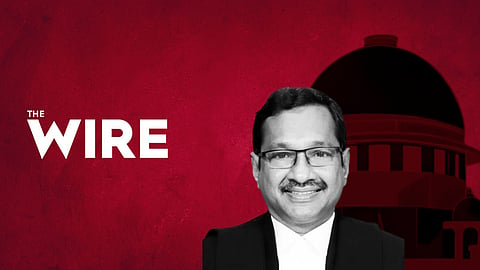

MORE THAN NINE YEARS after it had upheld the constitutional validity of criminal defamation law – then Sections 499 and 500 of the repealed Indian Penal Code and Section 199 of the Code of Criminal Procedure, 1973 – the Supreme Court on Monday remarked that time has come to decriminalise defamation law, now contained in Section 356 of the prevailing Bharatiya Nyaya Sanhita.
The remark, from Justice M.M. Sundresh heading a bench also comprising Justice Satish Chandra Sharma, came in the course of the hearing of a plea by the news portal The Wire challenging the issuance of summons by a magistrate court on a complaint by Jawaharlal Nehru University Professor Amita Singh, aggrieved by an article carried by the portal.
“The remark underscores the Supreme Court’s concern over the frequent invocation of criminal defamation and brings back into focus the issue of whether defamation involving private individuals can legitimately be classified as a crime when it serves no broader public purpose,” Justice Sundresh observed.
As Justice Sundresh remarked, “I think time has come to decriminalise all this.” Senior advocate Kapil Sibal agreed with the suggestion. Sibal was representing the petitioner, the Foundation for Independent Journalism, which runs The Wire.
The genesis of the matter is a 2016 article carried by the news portal which said that Prof. Amita Singh was at the helm of a group of JNU teachers who had compiled a 200-page dossier allegedly terming JNU a “den of organised sex racket.”
As per the report, the dossier was titled Jawaharlal Nehru University: The Den of Secessionism and Terrorism. The article stated that the dossier was submitted to the JNU administration, where some teachers were accused of encouraging a decadent culture in the university by legitimising separatist movements in India.
Thereafter, Prof. Singh filed a criminal defamation case against The Wire and its reporter. In February 2017, a magistrate court issued summons to the portal. However, in 2024, the Supreme Court set aside the summons, asking the magistrate to take a fresh call on issuance after examining the article.
In January this year, the magistrate again issued summons to the portal and its political affairs editor Ajoy Ashirwad Mahaprashasta. The Delhi High Court upheld the same on May 7, leading to the present challenge before the apex court.
During the hearing, the Court questioned the long pendency of the case. “How long will you go on dragging this?” the Bench asked. To this, Sibal said, “Similar matter is being considered. Rahul Gandhi’s case.” Following this, the Court issued notice in the matter.
The remark by the bench that the time has come to decriminalise defamation assumes significance as on May 13, 2016, the Supreme Court, while upholding the constitutional validity of the criminal defamation law, had said that it does not have any “chilling effect on freedom of speech.”
“Once we have held that reputation of an individual is a basic element of Article 21 of the Constitution and balancing of fundamental rights is a constitutional necessity and further the legislature in its wisdom has kept the penal provision alive, it is extremely difficult to subscribe to the view that criminal defamation has a chilling effect on the freedom of speech and expression,” Justice Dipak Misra, heading the bench also comprising Justice Prafulla C. Pant, had said in the 2016 judgment.
Justice Misra, who went on to become the Chief Justice of India, has since retired.
Rejecting the contention by the petitioners that defamation would be criminal only if it gave rise to incitement to constitute an offence, the Court had said: “It is difficult to accede to the submission that defamation can only get criminality if it incites to make an offence. The word ‘defamation’ has its own independent identity and it stands alone and the law relating to defamation has to be understood as it stood at the time when the Constitution came into force.”
In 2016, the top Court had also rejected the argument by the petitioners that the defamation of an individual by another individual could only be a civil wrong and could not be made a crime in the name of fundamental rights, as protection of private rights qua private individuals cannot be conferred the status of fundamental rights.
The 2016 judgment had come on a batch of petitions challenging the constitutional validity of the criminal defamation law by then Congress vice president Rahul Gandhi, then Delhi Chief Minister Arvind Kejriwal and BJP leader Subramanian Swamy.